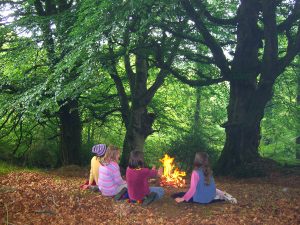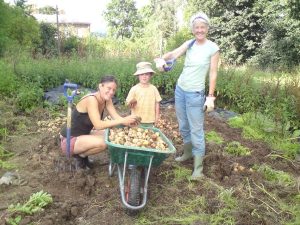This is an interview with Mariann and Gabor, a Hungarian couple with 2 young children, who left their jobs to go WWOOFing. We wanted to show that WWOOFing is a route out of the ‘rat race’ – a way to travel almost without money, and to re-think, learn new skills and make new contacts that could allow you to build a new career and a new life, even with young children. For more about what WWOOFing is see our topic introduction here and visit the WWOOF website here.
Lowimpact: What were you doing before you started WWOOFing?
Mariann: We were living in Malta with an 8-month old baby who was born there. Gabor was working as a kitchen designer with a furniture company. One day he came home and said that he hadn’t seen his child awake for a week. He said that he wanted to spend more time with his family, and that just wasn’t possible in a conventional job. He said that he loved his job, but he loved his family more. We decided to do something completely different, and Gabor quit his job.

LI: How long have you been WWOOFing and where have you been?
Mariann: We’ve been WWOOFing for 3 years, but we still haven’t finished. We travelled through Transylvania, living mostly off-grid, then Croatia, Slovenia and Austria. We had our second child at a farm in Slovenia, and they were thrilled. They said that they considered it a blessing for the farm. They wanted us to house-sit for them through the winter, while they went away. This was very helpful for us, as it allowed us to settle, with the extra member of the family. We stayed there all winter, doing necessary little jobs and keeping the place secure. In the spring, we worked on greenhouse planting, then we popped back to Hungary to see our families, before continuing on to Austria.

LI: How many hours do you work?
Gabor: You’re expected to work 5 hours per day, 5 days per week, but that’s just a guideline. We often work more because we enjoy it. I used to run my own company, and I’ve been an assistant manager, helping to run someone else’s company. For me, that was much harder work than WWOOFing, and not as much fun.

LI: Wasn’t it difficult travelling and WWOOFing with young children?
Gabor: Fewer hosts will accept WWOOFers with children, but when we’re accepted by a host, it’s not a problem. The kids come into the garden with us. They were born into this life and they don’t know any different. They love to be in nature, and they love to help. They love tractors and farm machinery, and they especially love worms. They’re still very excited about almost everything to do with farms. They never watch TV, but we travel with a laptop, so they’re able to get on the internet, and they’re learning how to use computers.
We were WWOOFing with a Belgian couple who also had kids with them. Those kids will see a different kind of life from most young people, who leave school, then go to university, then work, with no idea of what it’s like to be truly free, or to live close to nature. WWOOFing is really great for kids, I think – they get to see different cultures, meet incredible people and learn lots of new skills.

LI: What kinds of skills have you learned?
Gabor: I grew up on a farm, so I remember skills that I learned as a child. Mariann is a city girl who didn’t have any farm skills when we started – but she does now. She’s learnt about animal care, permaculture, growing fruit and vegetables and most importantly, what not to do. WWOOFing is like a free smallholding course. We’ve been asking hosts what mistakes they’ve made, because I think it’s easier to learn from things that have gone wrong than from things that have gone right. I’ve learnt plenty of new things too – especially working with clay and cob. I’ve learnt clay plastering – how to mix the right proportions of materials, and how to prepare walls and how to lay on the plaster. Mariann has gone from zero farm knowledge to ready to run a smallholding. Before WWOOFing, she knew that a chicken had 2 legs, but that was about it.

LI: How much money do you need?
Mariann: We have a car, and petrol is our biggest expense. Accommodation and food is provided by the hosts. We have to make some sacrifices – for example, we don’t get to eat chocolate very often, but that might be an advantage – especially for the kids. Actually, the sacrifices really aren’t that bad – we’ve given up fashionable clothes, but so what? We have only work clothes, with one set each of slightly nicer clothes if we’re going into town. It’s no sacrifice, really. The kinds of things we like doing tend to be free – like hiking in national parks or visiting museums. It’s possible to live completely for free – we’ve met young people, like the two New Zealand girls working where we are now, who hitch-hike between WWOOF hosts, and don’t spend any money at all.

LI: Highlights?
Mariann: Looking back, everything has seemed so easy, and we’ve met amazing people. At one place, we were preparing the venue for a forest school. Nature had taken over, and it was a really magical job in the forest, with a stream passing next to our bedroom window – really beautiful and relaxing. We also attended a festival with a WWOOF stand at one point, and we gave a talk about our travels. Another couple gave a talk about their WWOOF travels around Asia and New Zealand. The talks went down very well with the audience.

LI: Did you miss friends and family?
Gabor: It’s not like 20 years ago – now we can chat every week on Skype with friends and family.
LI: Any other problems?
Mariann: Well, it would be nice to be able to have a Europe-wide WWOOF membership, but at the moment, we have to join the WWOOF association for each country we visit. At one point we also joined ‘Workaway’, which covers the whole of Europe. Not all of their hosts are organic though, so we prefer WWOOF, because we tend to share the same values as organic hosts.

If there are any problems at particular hosts, they can usually be worked out – but if not, you’re not obliged to stay anywhere, you’re free to leave at any time.
LI: What advice would you give to anyone thinking of doing this?
Gabor: Don’t think too long – just quit your job and do it. Be brave – it’s really satisfying. After you start, new possibilities open up as you meet new people. It’s starting that’s the most difficult thing – intertia, really. And ultimately, if you don’t like it, you can just go back to a normal job and city life.

LI: What next?
Mariann: We’re now in a small village, back in our home country of Hungary, and still WWOOFing, but I think it might be coming to an end now. We’re not 100% sure what we want to do, but I’d like to work with soil / plants / horticulture, and Gabor wants to work with wood / carpentry, and maybe we’ll host yurt holidays or ‘glamping’. We want to buy our own land, to have a smallholding – we want to find our own ‘miracle deer’ (Hungarians will understand what we mean by that).

We might also live in a community. We’ve been checking out a few communities, and we’re also working on a van, turning it into a camper van. Plus we’re learning preserving techniques, to make the harvest stretch over the winter months. As for our home, we’d like to build an earthship – that is, a house that is autonomous, off-grid for electricity, water and sewage, like a ‘ship’ that floats on the earth. Unfortunately though, it’s not allowed in Hungary at the moment – you can’t get permission to build one. There are people working on that though, and we’re part of the Hungarian Earthship Association, who are campaigning, and working with architects and lawyers to put pressure on the government to allow them. We felt that the government opposed off-grid living because if you’re off-grid, it’s much more difficult to control you. We think we’re winning though – earthship walls tend to be made from recycled car tyres rammed with earth. There is some concern about fire safety, but we’re working with the fire department, and doing tests to allow earthships to obtain fire safety certificates.
I think we’ll miss WWOOFing. An Austrian host said that he’s jealous of WWOOFers, and the incredible experiences they have through WWOOFing. We will definitely have WWOOFers on our smallholding – you get to meet interesting people and it’s much easier to get things done.















8 Comments
What a wonderful decision an learning opportunity for both parents and children! Though not for everyone long-term, I can’t think of how a similar experience wouldn’t be enriching for anybody. I hope they get permission to build an earthship and use all the skills they’ve learned while WWOOFing.
There is an Earthship/Groundhouse currently being constructed on The Isle of Sheppey, England under English Building Regulations as a domestic dwelling, 1st dwelling of this type in UK. Fire is not an issue as the tyres are covered in clays/plaster and packed with earth, therefore no air pockets for fire to breath and no spread of flame due to plaster and render. Leaching of poison from tyres also not an issue as the tyres are inert once protected from UV light as confirmed by the Environment Agency. Tougher English Building Regs required additional waterproofing measures as opposed to Eathships constructed under other countries regs. The owners are on Facebook.
Wow. I’m amazed that the states are actually ahead of other nations in one thing. Earthships are not “common” in the states, but not hard to find either. We almost bought one in a whole neighborhood that lives off the grid (not all are Earthships) near Idaho Springs, Colorado, USA. I wonder if there are many retired folks who do this.
What a fab blog post. So inspiring! I’ve often thought about WWOOFing but have never around to doing it. If I’m honest I’m probably a bit scared of the unknown and of doing something a bit different. But I hope I will overcome those fears. I definitely feel a passion to travel, to learn and to be with like mind people who want to work in harmony with their surroundings. Watch this space…I might be joining Mariann and Gabor soon!
I am just wondering – where do you get money for doctors, medicines, diapers, cosmetics etc? You must have some other income too.
Hi Ewa,
we had some savings and we live a very simple life, using cloth diapers for the boys and we are never sick 🙂 (but we do have insurance) and we have a flat to rent (passiv income). BUT we don’t spend much.
We met a russian couple traveling with their child (5) they made jewelleries/crochets and sold on Etsy…
Lucky!!! For me, as an inhabitant of the Middle East, I can’t travel with my own car, only flights, and I need visa almost to everywhere. This makes this adventure more difficult and expensive. But it worth it 🙂
What a great way to let your kids experience different cultures and the outdoors! We have been thinking of doing workaways or woofing in the near future, but I had some doubts because of the kids (we got a 2yo and a newborn of only 4 days old :)) but this story gave me the last push. Thank you for that!